鬼が笑うとは?
「鬼が笑う(おにがわらう)」とは、将来のことについて話すときに使われる日本のことわざで、「未来のことを軽々しく語ると、鬼も笑ってしまう」という意味です。未来のことは予測がつかないため、現時点で確かなことはわからないのに、あれこれ計画や予測を立てるのは、非現実的で空しいことだという考えが込められています。
このことわざの背景
日本では、鬼は超自然的な存在として、神仏に次ぐ神秘的な力を持つと考えられてきました。鬼は人間の力を超えた存在であり、未来や運命を見通す力があるとされています。そのため、人間が未来を簡単に予測したり、軽はずみに語るのを見て、そんな人間の愚かさに「鬼でさえ笑ってしまう」という意味になったのです。
この表現の使われ方
「鬼が笑う」は、主に以下のような状況で使われます。
不確かな未来の話をするとき
未来のことを断定的に話す人や、確実ではない計画を口にする人に対して「鬼が笑うよ」と忠告する形で使われることがあります。たとえば、「来年の話をすると鬼が笑う」という言い回しがあり、まだどうなるか分からない未来のことを話題にすることへの警鐘を表しています。
先のことを軽々しく計画しているとき
確実な根拠もなく楽観的に未来の話をする人に対して使います。「再来年にはもう楽に暮らしているはず」などの根拠のない話に対し、周囲の人が「そんなことを言うと鬼が笑うよ」と注意することがあり、控えめにするよう促す意味も含まれます。
控えめな姿勢を勧めるとき
未来のことは予測できないものであり、過信したり楽観的すぎる考え方は慎んだほうが良い、という姿勢を促すためにも使われます。「鬼が笑う」という言葉には、謙虚さを持って行動し、地道に努力することの大切さも暗に含まれています。
類似表現
「先のことはわからない」「明日は明日の風が吹く」といった表現も似た意味を持ちますが、「鬼が笑う」ほどの戒めや軽はずみに話すことへの警告のニュアンスは薄いです。また、「捕らぬ狸の皮算用」も、未来に対して楽観的すぎる計画を立てることの愚かさを指す言葉で、「鬼が笑う」と近い意味で用いられることがあります。
「鬼が笑う」は、未来が不確実であることを念頭に置き、慎重であるべきだという戒めの意味を込めたことわざです。未来を予測したり断定的に話すのではなく、控えめに謙虚な姿勢を持つことを日本人に教える表現であり、「未来のことはわからない」ということを心に留めておくよう、促す言葉です。
Onigawarau” is a Japanese proverb used when talking about the future. The proverb expresses the idea that since the future is unpredictable, it is unrealistic and empty to make plans and predictions when nothing is known for sure at this point in time.
Background of this proverb
In Japan, demons have been considered supernatural beings with mystical powers second only to the gods and Buddha. It is believed that demons are beyond human power and have the power to foresee the future and one’s destiny. Therefore, when they saw humans predicting the future so easily or speaking so carelessly, the expression came to mean that “even demons laugh” at such human foolishness.How this expression is used
The phrase “even the devil laughs” is used primarily in the following situationsWhen talking about the uncertain future:
It is sometimes used in the form of a warning to someone who speaks definitively about the future or who speaks of plans that are not certain, “The devil will laugh at you. For example, the phrase “the devil will laugh when you talk about next year” is used to warn people against talking about the future, which they do not yet know what will happen.This is when we are making rash plans for the future:
This phrase is used for people who talk about the future optimistically without any solid evidence. When someone says something like, “I’ll be living comfortably the year after next,” people around you may warn you, “The devil will laugh at you if you say that.When recommending moderation:
It is also used to encourage an attitude that the future is unpredictable and that one should refrain from overconfidence or overly optimistic thinking. The phrase “the devil laughs” also implies the importance of acting with humility and making steady efforts.Similar expressions
Expressions such as “You never know what the future holds” and “Tomorrow will bring the winds of tomorrow” have a similar meaning, but are not as nuanced as “the devil laughs” in their warning against caution and careless speech. Another expression, “catch no tanuki no kakakuyoso,” refers to the folly of making overly optimistic plans for the future, and is sometimes used in a similar sense to “oni ga warau” (the devil laughs).Conclusion
Oni ga laugh” is a proverb that reminds us to be cautious and keep in mind that the future is uncertain. It is an expression that teaches Japanese not to predict the future or speak definitively, but to be modest and humble, urging us to keep in mind that “the future is uncertain.
AIが描いた「鬼が笑う」
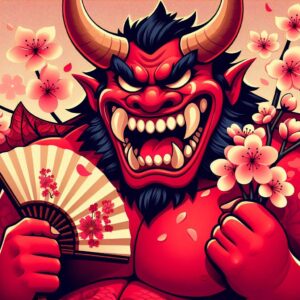
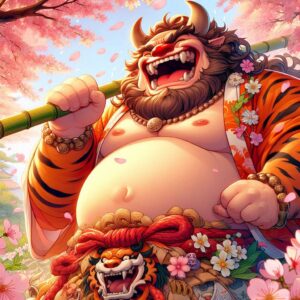

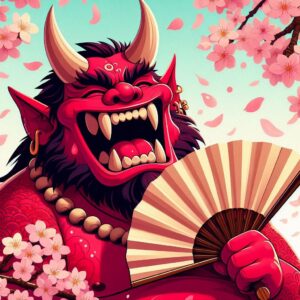
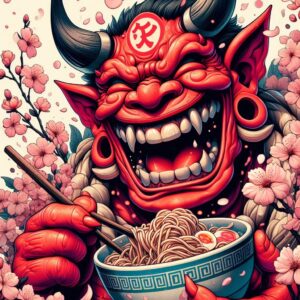
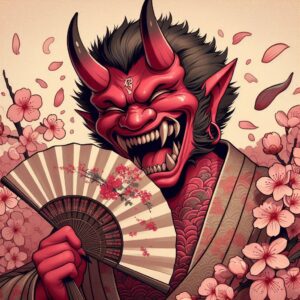











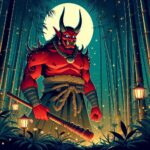




コメント